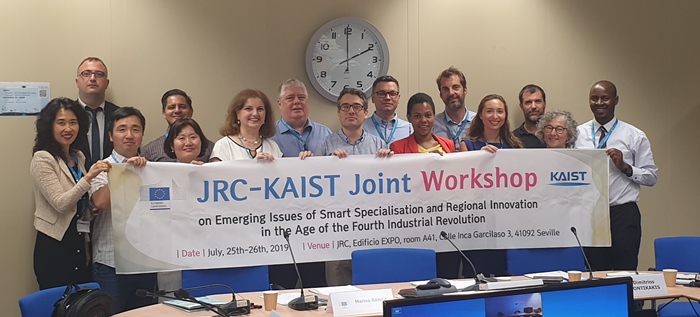event

The Fourth Industrial Revolution Intelligence Center (FIRIC) at KAIST discussed ‘Smart Specialization’ for regional innovation and economic growth in the wake of the Fourth Industrial Revolution during the workshop with the EU Joint Research Center (EU-JRC) in Seville, Spain last week. The two sides also agreed to sign an MOU to expand mutual collaboration.
KAIST’s FIRIC was founded in cooperation with the World Economic Forum in July 2017 to carry out policy research for the promotion of science and technology-based inclusive growth and innovation and to lead related global efforts. The EU-JRC has committed to developing cohesive policies that aim to narrow regional gaps within the European Union. Founded in 1958 in Brussels, the EU-JRC has long been in charge of EU strategies for regional innovation based on emerging technologies.
The workshop also covered issues related to public-private partnerships and innovation clusters from the perspective of the EU and Asia, such as the global value chain and the implementation of industrial clusters policy amid the changes in the industrial ecosystem due to digitalization, automation, and the utilization of robotics during the Fourth Industrial Revolution.
In addition, the session included discussions on inclusive growth and job market changes in the era of the Fourth Industrial Revolution, addressing how Smart Specialization and the outcomes of the 4IR will shift the paradigm of current job and technology capabilities, as well as employment issues in many relevant industries. In particular, the actual case studies and their related policies and regulatory trends regarding the potential risks and ethical issues of artificial intelligence were introduced.
Regarding the financial services that utilize blockchain technologies and the establishment of public sector governance for such technologies, the participating experts noted difficulties in the diffusion of blockchain-based local currencies or public services, which call for a sophisticated analytical and practical framework for innovative and transparent governance.
Dr. Mark Boden, the Team Leader of the EU-JRC, introduced the EU’s initiatives to promote Smart Specialization, such as its policy process, governance design, vision sharing, and priority setting, with particular emphasis on targeted support for Smart Specialization in lagging regions.
Professor So Young Kim, who is the dean of the Graduate School of Science and Technology Policy and FIRIC’s Deputy Director said, “KAIST’s global role regarding the Fourth Industrial Revolution will be expanded in the process of exploring and developing innovative models of technology-policy governance while working jointly with the EU-JRC.”
-
event KAIST’s RAIBO2 becomes the World’s First Robo-dog to Successfully Complete a Full-course Marathon
KAIST's quadrupedal walking robot "RAIBO", which can run seamlessly on sandy beaches, has now evolved into "RAIBO2"and achieved the groundbreaking milestone by becomeing the world's first quadrupedal robot to successfully complete a full-course marathon in an official event. < Photo 1. A group photo of RAIBO2 and the team after completing the full-course marathon > KAIST (President Kwang Hyung Lee) announced on the 17th of November that Professor Je Min Hwangbo's research team of t
2024-11-17 -
event KAIST’s Beach-Roaming Quadrupedal Robot “RAIBO” to Run a Marathon!
“RAIBO”, KAIST’s four-legged robot featuring remarkable agility even on challenging terrains like sandy beaches, is now set to be the first in the world to complete a full marathon. < Photo 1. A group photo of the research team of Professor Je Min Hwangbo (second from the right in the front row) of the Department of Mechanical Engineering who participated in the marathon event at 2024 Geumsan Insam Festival last September > On the 17th of November, KAIST (represen
2024-11-15 -
event KAIST and Merck Sign MOU to Boost Biotech Innovation
< (From left) KAIST President Kwang-Hyung Lee and Merck CEO Matthias Heinzel > KAIST (President Kwang-Hyung Lee) signed a Memorandum of Understanding (MOU) with Merck Life Science (CEO Matthias Heinzel) on May 29 to foster innovation and technology creation in advanced biotechnology. Since May of last year, the two institutions have been discussing multidimensional innovation programs and will now focus on industry-academia cooperation to tackle bioindustry challenges with this MOU a
2024-05-30 -
event KAIST to begin Joint Research to Develop Next-Generation LiDAR System with Hyundai Motor Group
< (From left) Jong-Soo Lee, Executive Vice President at Hyundai Motor, Sang-Yup Lee, Senior Vice President for Research at KAIST > The ‘Hyundai Motor Group-KAIST On-Chip LiDAR Joint Research Lab’ was opened at KAIST’s main campus in Daejeon to develop LiDAR sensors for advanced autonomous vehicles. The joint research lab aims to develop high-performance and compact on-chip sensors and new signal detection technology, which are essential in the increasingly compe
2024-02-27 -
event Team KAIST placed among top two at MBZIRC Maritime Grand Challenge
Representing Korean Robotics at Sea: KAIST’s 26-month strife rewarded Team KAIST placed among top two at MBZIRC Maritime Grand Challenge - Team KAIST, composed of students from the labs of Professor Jinwhan Kim of the Department of Mechanical Engineering and Professor Hyunchul Shim of the School of Electrical and Engineering, came through the challenge as the first runner-up winning the prize money totaling up to $650,000 (KRW 860 million). - Successfully led the autonomous collaborat
2024-02-09